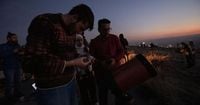The crescent moon's appearance marks the start of each Hijri month in the Islamic calendar, which is based on the lunar cycle. The first day of Shawwal, the tenth month in the Islamic calendar, coincides with Eid-ul-Fitr. The precise date of Eid changes every year depending on religious authorities' observations of the moon because lunar months are either 29 or 30 days long.
Eid-ul-Fitr 2025 is expected to be celebrated in Saudi Arabia on Sunday, March 30, 2025, if the crescent moon is visible on March 29, 2025. If the moon is not visible on that day, the date of Eid will shift to March 31, 2025. This year, Saudi Arabia, along with the United Arab Emirates and Qatar, began fasting Ramadan on March 1, 2025, according to reports from Money Control.
In Saudi Arabia, the official Eid-ul-Fitr 2025 holiday schedule indicates that the public sector's last day of work will be Monday, March 24, 2025, which is the 24th day of Ramadan 1446 AH. For the private and non-profit sectors, the holidays will commence after work on Saturday, March 29, 2025, marking the 29th day of Ramadan.
As the last few days of Ramadan draw near, families in Saudi Arabia are busy preparing for the celebrations, baking traditional treats, buying new clothes, and organizing gatherings. Markets and streets are filled with activity as people decorate their homes and purchase gifts for loved ones. On the morning of Eid, families typically gather at mosques for communal prayers, which consist of two rak'at, or units of prayer, and six additional takbirs (the Arabic phrase "Allahu Akbar").
After a month of fasting from dawn to dusk, families come together for their first breakfast feast after the prayers. In many Arab countries, visiting family and friends is also a common practice during Eid Al-Fitr. As preparations for the holiday unfold, the excitement is palpable in Saudi Arabia.
Meanwhile, in the UK, Muslims are also anticipating the announcement of Eid ul Fitr 2025, which is expected to occur this weekend. Many in the UK will look for the crescent moon on either Saturday, March 29, or Sunday, March 30. Unlike in many Islamic countries, the UK does not have a governmental moon-sighting committee to provide a unified announcement, leading to variations in the Eid dates across the country.
Many mosques and organizations in the UK align with announcements from Saudi Arabia, given its significance as the location of Islam's holiest sites. However, several British moonsighting groups advocate for local sightings, encouraging Muslims to look for the crescent moon in the UK. Dr. Zahid Nawaz, a Midlands-based moonsighting expert, advises that since the majority of the UK began Ramadan on March 2, 2025, Muslims should look for the crescent on Sunday, March 30, which is the 29th day of Ramadan.
Dr. Nawaz describes the act of spotting the crescent as "not only a spiritual experience but also an enjoyable one," emphasizing the importance of local engagement in the sighting process. The New Crescent Society organizes nationwide moonsighting events, encouraging communities to gather in optimal viewing locations.
Islamic leaders worldwide support the idea that Muslims in the UK should focus on local moonsightings. One expert from India stated, "Muslims of Britain should follow the base rule of Local Moon Sighting. There is no need or necessity now to follow the news of near or far distant countries." Another expert from Pakistan echoed this sentiment, arguing that when the moon is visible locally, relying on the sightings from other countries is unnecessary.
Despite the push for local sightings, some UK communities continue to follow the announcements from Saudi Arabia, including the Green Lane Masjid and Community Centre (GLMCC) in Birmingham, which hosts large Eid celebrations. GLMCC Head Imam Sheikh Zakaullah Saleem explained that Saudi Arabia's rigorous system for moon sighting, which employs advanced technology and trained observers, lends credibility to their announcements.
He noted that the Saudi Islamic Courts are well-coordinated in announcing moon sightings, making it easier for Muslims to track official declarations. This has led to a reliance on Saudi Arabia's announcements, despite some skepticism regarding their accuracy. In fact, many believe that Saudi officials tend to align their announcements with predetermined dates rather than actual visibility.
This discrepancy has given rise to what some humorously refer to as "moon wars" on social media, with differing dates leading to confusion and debate. Dr. Nawaz has previously urged the community to "stop the moon fighting and do accurate moonsighting" to foster unity among Muslims.
In addition to the anticipated Eid celebrations in Saudi Arabia and the UK, other regions are also preparing for the holiday. In India, Ramadan began on March 2, 2025, following the sighting of the new crescent moon on March 1. Consequently, Eid-ul-Fitr in India is expected to be celebrated on either March 31 or April 1, depending on local moon sightings.
Dubai's Roads and Transport Authority has announced that all public parking will be free during the Eid al-Fitr holiday, except for multi-level parking terminals, from Shawwal 1 to 3, with regular fees resuming on Shawwal 4. In Palestine, Eid Al-Fitr is likely to be observed on March 31, based on moon sighting predictions, with local authorities confirming the date.
In the Philippines, President Marcos has declared Tuesday, April 1, 2025, a regular holiday for the observance of Eid’l Fitr. In the UAE, predictions suggest Eid will fall on March 31, 2025, as the Shawwal crescent may not be visible on March 29, indicating a complete 30-day Ramadan.
As the global Muslim community prepares for Eid-ul-Fitr, the variations in moon sightings and the significance of local customs continue to shape the celebrations. The anticipation surrounding the crescent moon serves as a reminder of the shared faith and traditions that unite Muslims worldwide.







